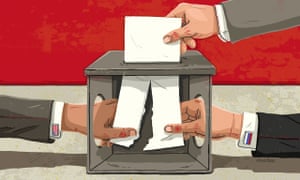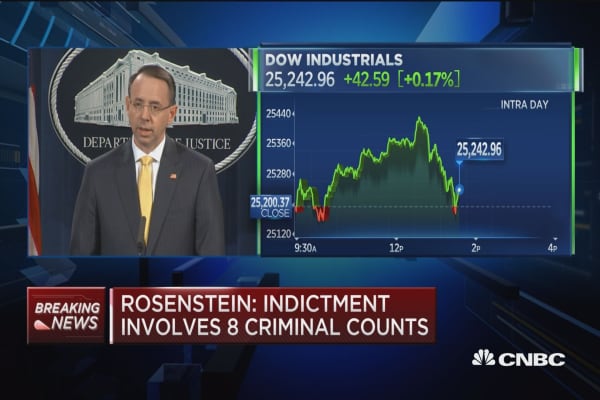United States vs Russia ... Foreign Election Interventions
"It was completely wrong of Vladimir Putin to intervene in this way [to influence the outcome of the 2016 U.S. presidential election]."
"That said, the methods they used in this election were the digital version of methods used both by the United States and Russia for decades, breaking into party headquarters, recruiting secretaries, placing informants in a party, giving information or disinformation to newspapers."
Richard M. Bissell Jr., former chief of C.I.A. operations
"If you ask an intelligence officer, did the Russians break the rules or do something bizarre, the answer is no, not at all."
"[The United States] absolutely [has carried out such election influence operations historically], and I hope we keep doing it."
Steven L. Hall, retired, former chief, C.I.A. Russian operations
 |
| Illustration: Eva Bee |
The difference in how the United States and Russia carry out their covert operations to influence political outcomes in their rival states is very real and unequivocal, however, both retired C.I.A. heads claim. While American interventions have been structured of late to aid non-authoritarian candidates with their challenges to dictators or in some manner help to promote democracy, Russia focuses on intervening for the purpose of disrupting democracy. As why would an autocratic post-Communist state not, after all? Democracy is not their chosen schtick.
American intelligence has given fresh warning that Russia is once again preparing to reiterate in 2018 its interventions that took place in 2016; hacking, leaking, social media manipulation for starters. This was followed by the announcement by Robert Mueller, special counsel looking into the 2016 election interference, that thirteen Russians and three companies have been indicted for their roles in close Kremlin ties, for the three-year scheme using social media to attack Hillary Clinton while boosting Donald Trump.
In this, the C.I.A. is at a disadvantage in that Vladimir Putin has taken precautionary steps to neutralize challengers to his bid for another term at the Russian presidency. Laying questionable criminal charges against the most influential and popularly supported opposition leader Alexei Navalny, Putin went on to bar Navalny from entering the race based on criminal charges brought against him. The remaining opposition candidates simply haven't the support to make significant inroads in the election results that will result in Putin's re-election by a wiiide margin.
According to Loch K. Johnson whose career spanned the 1970s forward on a Senate committee as a staff member investigating the C.I.A., Russia's operation in 2016 quite simply represented the cyber-age version of standard American practices "We've used posters, pamphlets, mailers, banners -- you name it. We've planted false information in foreign newspapers", explained Mr. Johnson from his new perch at the University of Georgia.
The C.I.A. famously gave aid in the overthrow of elected leaders in Iran and Guatemala in the 1950s, backed violent coups in the 1960s, plotted assassinations and supported anti-Communist governments in Latin America, Africa and Asia, irrespective of how brutally they treated their populations. That kind of devious and morally unsupportable interventions, hasten Messrs. Hall and Johnson to assure, no longer reflect American policy which now focuses on strengthening democracy abroad.
On the other hand, election meddling in other nations' sovereign affairs while certainly unethical, is accepted as -- albeit political as in Realpolitik -- meddling. Dov H. Levin, a Carnegie Mellon scholar, scoured the historical record to determine the extent and depth of election influence operations mounted by both the U.S. and Russia, to discover 81 such events conducted by the United States, and 36 by the Soviet Union or Russia between 1946 and 2000 which he could discern.
The C.I.A.'s intervention in Chile in 1964 is clarified in a declassified report hat reads approvingly of the "hard work" done by the agency in supplying "large sums" to the candidate of its favour, portraying him as a "wise, sincere and high-minded statesman", while portraying his leftist opposition as a "calculating schemer." Over a prolonged period there were greater instances of American influence operations mounted by the State Department and affiliates. The U.S. funded an ultimately successful effort to defeat Slobodan Milosevic in Serbia's 2000 election.
President Bill Clinton became involved in a drive to aid Boris Yeltsin's re-election in 1996 as president by dangling the carrot of an assured American support to achieve a $10-billion international Monetary Fund loan to Russia four months before voting day. Vladimir Putin views more recent American ventures in support of foreign groups, teaching basic campaign skills and how to build democratic institutions and the training of election monitors as a malign threat, not the benign good Americans feel it to be.
Understandably, given that one group, the National Endowment for Democracy, rendered a $23,000 grant to an organization that employed Aleksei Navalny in 2006, years later to become Vladimir Putin's major political nemesis. "I assume they're [the U.S.] doing a lot of the old stuff, because, you know, it never changes. The technology may change, but the objectives don't", said William J. Daugherty, who worked from 1979 to 1996 for the C.I.A.

Declassified CIA files are replete with examples of agency interference in foreign elections, including state elections in India and West Germany and provincial elections in Australia, Canada, and Japan...
In the 1950s, the CIA provided massive support to the West German Christian Democrats, which were led by Chancellor Konrad Adenauer. The CIA also did its best to suppress supprt for the West German Social Democrats and the far-right nationalist German Party in Berlin, Hesse, and Bavaria.
In 1967, Indian Foreign Minister M. C. Chagla charged that the CIA "meddled" in India's election, mainly through financial donations to parties in opposition to the ruling Indian Congress party. The CIA particularly targeted Communist parties in West Bengal and Kerala states.
Former Canadian Prime Minister John Diefenbaker of the Conservative Party charged in 1967 that CIA funds were used to bolster the Liberal Party, which contributed to Diefenbaker's electoral losses in two general elections held between May 1962 and June 1963. Diefenbaker's successor, Prime Minister Lester Pearson of the Liberal Party, discovered that the CIA funneled cash to the pro-Liberal Canadian Union of Students in 1965 and 1966.
The CIA did everything possible to defeat for re-election the New Zealand Labor Party government of Prime Minister David Lange. The CIA provided propaganda support to the opposition National Party, which was opposed to Lange’s policy of denying entry to New Zealand waters of US nuclear-armed and nuclear-powered warships. The CIA ensured that pro-American media in New Zealand harped on about New Zealand record-high 6 percent unemployment, the nation’s foreign debt being half of its gross domestic product, and $1 billion budget deficit. The CIA also attempted to suppress traditional Maori support for Labor in the August 15, 1987 election, a cynical use of race-based politics to alter an election outcome.
Between 1965 and 1967, the CIA station in Brazil, working in conjunction with the AFL/CIO union in the United States and its international arm, the American Institute of Free Labor Development (AIFLD), were discovered to be interfering in union elections in Brazil. The Sao Paulo office of the AIFLD, which was nothing more than a CIA front, made cash payments to Brazilian officials to corrupt union elections in the Brazilian petroleum sector. An itemized list of CIA bribes to Brazilian officials was discovered by a Sao Paulo union official: “Bonus to Jose Abud for collaboration – $156.25; Special payment to Dt. Jorge M. Filho of Labor Ministry – $875.00; Trip for Mr. Glaimbore Guimasaes, our informer at Fegundes St. – $56.25; Photocopies of books and documents of Petroleum Federation – $100.00; Assistance to Guedes and Eufrasio to defeat Luis Furtado of the Suzano Union – $140.64.”
Prior to the September 4, 1964 Chilean presidential election, the leftist Popular Action Front opposition discovered that US chargé d’affaires Joseph Jova was assisting the Christian Democratic Party candidate. Christian Democrat Eduardo Frei Montalva, with the CIA’s help, defeated Allende.
A CIA memo dated October 3, 1955, describes CIA support for the pro-Western. Masjumi Party in the Indonesian election, the nation’s first since independence. CIA director Allen Dulles appeared to be hopeful about the chances of a Masjumi victory due to Indonesia’s “large percentage of illiterates.” In the 1984 El Salvador presidential election, the CIA supported Christian Democrat Jose Napoleon Duarte over the more extreme-right winger, Roberto d’Aubisson. Republican US Senator Jesse Helms of North Carolina charged that the CIA “meddled” in the election on behalf of Duarte. It was even discovered that the “invisible ink” used on the fingers of those who had voted was supplied from the CIA.
Labels: Elections, Intervention, Russia, United States
0 Comments:
Post a Comment
<< Home